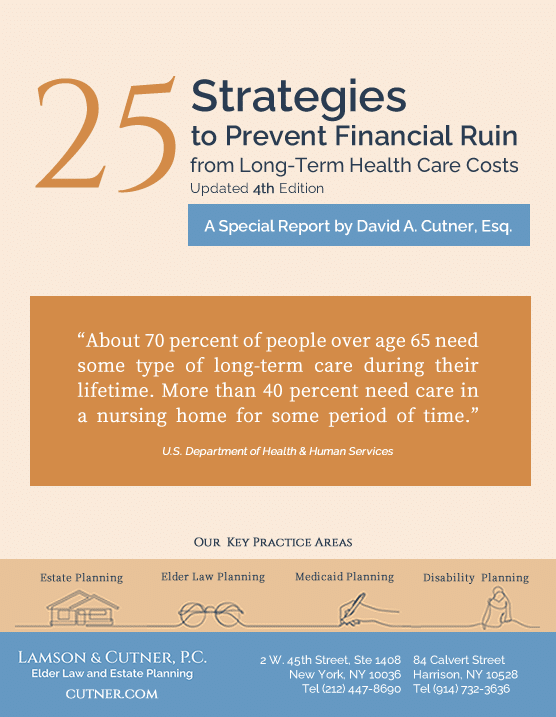This is Strategy #20 from Lamson & Cutner’s publication, “25 Strategies to Prevent Financial Ruin from Long-Term Health Care Costs.” Click here to see the other strategies.
A Health Care Proxy is a legal document that authorizes someone you appoint to make medical and health care decisions for you, if you are unable to do so yourself. These include end of life decisions. The idea behind a Health Care Proxy is that someone makes the decisions you would have made, had you been able.
Therefore, it’s critical that your health care agent clearly understands your wishes concerning your medical and health care, and the circumstances in which you may choose not to have your life sustained.
Health Care Proxies are valuable for another important reason. They prevent and help resolve disputes within families. The health care agent has sole discretion in making decisions, and is operating based on your philosophy about medical choices. Legally, family members who disagree will find it extremely difficult to interfere.
The Family Health Care Decisions Act (FHCDA), passed March 2010, gives family members, and others deemed in close relationship to you, the right to make medical and life-sustaining decisions on your behalf, if you become mentally incapacitated. The problem is that, as with any new law, it’s difficult to determine how it will be interpreted and applied. The legislation contains a number of ambiguities, and it also permits others to object, which can lead to delays and litigation.
Since you want to avoid potential court proceedings that could arise from such a dispute, a Health Care Proxy is still essential to good planning. You can choose the specific health care agent you want, instead of leaving it to a statutory table and the discretion of others. Decision-making becomes an easier and more streamlined process.
A Living Will is another vehicle for having your wishes carried out, but can be problematic. With a Living Will, you spell out your instructions in writing. The difficulty is in its interpretation. Common phraseology such as “if there is little hope of recovery, I would not want heroic measures to be taken to preserve my life,” may mean different things to different family members.
Where one sees a hopeless situation, another believes there’s a chance of recovery. Heroic to one, is ordinary to another. Consequently, there is simply no reliable way of writing a Living Will that covers all possible medical contingencies and viewpoints.
For those who are uncomfortable with a Health Care Proxy, a Living Will is seductive because it gives the illusion of control. In fact, a Living Will is likely to create opportunities for conflict, and could lead to a lawsuit. We don’t recommend it.
Instead, choose someone you trust, and who you feel will be committed to making the decisions you would make. Then, make sure you communicate your wishes to that person as clearly and completely as possible. No document can replace the informed judgment of an intelligent, compassionate person.
visit our key practice areas


